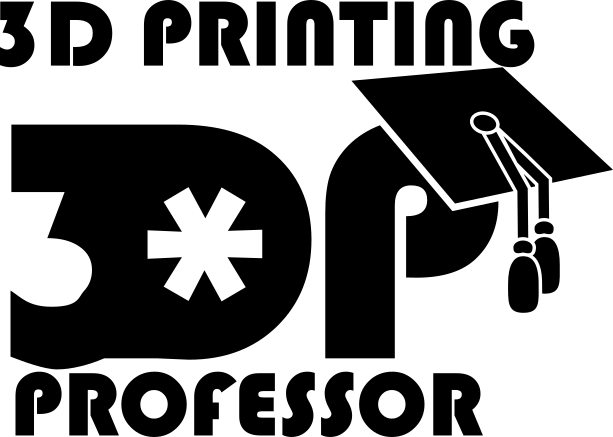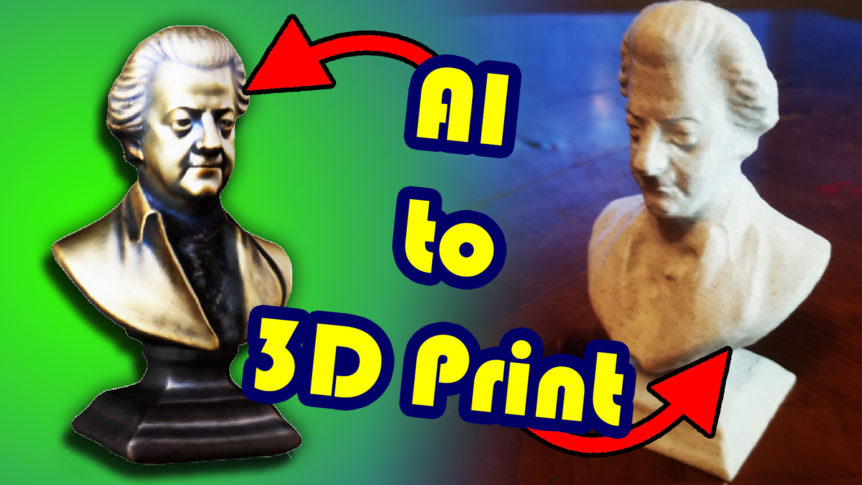I have been trying to figure this out for weeks. I first heard about Luma and checked out their site on the 14th. And then it took me until Tuesday to figure out how to bake textures like this so I could work the displace. And after posting about it on Twitter, and getting an overwhelmingly positive response, I rushed out this video to explain the process. SO the video makes it look like I know what I’m doing, but a mere 2 weeks ago I was completely lost.
I’m also getting into the habit of making a reduced version of the video in short form. Last time I did that the short was well recieved, but the video was less well received. This time I decided to make sure to call out the longer video in the short. I guess we’ll see if that helps.
But in truth, I don’t know if this is actually Ai generated in the first place. Really, this should be titled “turning a 3D model meant for games into a 3D model for 3D printing with Blender texture baking and a displace modifier”, but that doesn’t catch the sweet clickbait search terms.
Lemme just say my opinion on AI generated art is… nuanced. It’s a multifaceted conversation that tends to get emotional quickly. First of all, let me say I think I understand why a lot of people are extremely emotional about the subject. And I will address that in just a few paragraphs.
But starting at the beginning, it’s very important we all acknowledge that it’s coming. Ai content generation is coming and it’s coming fast. Staunchly fighting it, or refusing trying to stop it by siting law and artists rights (that in reality they don’t have) isn’t going to help. It’s important that if you opposed to it that you pick your battle carefully. But I think it would be better and easier to accept it’s coming and find the upside. I personally think Ai generated assets will be a great tool for story tellers and content creators to do more with less, making what was once only possible with teams of people, possible with one person and some AI tools.
Now, concerning the copyright infringement question (and do not use the term “steal” if you don’t want to look like a fool), let me just jump to the end (I’m cutting out 7 paragraphs of discussion here, just to let you know how this stings) and say; in the US, if a machine does the copying without human interaction, there is no copyright violation. At least not yet. And if we decide to start applying copyright code to machines, that would effect more than just art asset generators. For instance, search engines would need to shut down until they got permission from every website they indexed. That useful little thing Google does where when you make your search term in the form of a question it just scrapes the answer and give it to you? Yeah, that would have to stop too (and I acknowledge that there are already people upset with this). This is the battle we would have to fight, and this is the people we’re fighting and the collateral damage it could entail. And even if we try to legislate it, how’s it going to be enforced? Every attempt to discern what went into a deep learning statistical model from the output of the model has proven unsuccessful. They could just tell us they’re complying and we’d never know.
So on that note of legal impotence, let’s get emotional.
As someone who creates, I 100% get it. I get how it feels when someone takes something you made and makes something with it you didn’t consider or approve of. It stings. Partially, I think, if we’re being honest, there’s an element of envy to the feeling. Why didn’t we think of that? Why didn’t we do that? The problem with being the giant that someone stands on the shoulders of, is sometimes you envy their view.
But that emotional reaction might go even deeper, to our very core and identity. What if it turns out that something we thought was fundamentally human, the fruit of the muse, could be suitably approximated by a difference engine? Does that mean there’s anything left that makes us fundamentally human? We’ve had our labor taken away by domesticated animals, and then taken it way from them with machines and automation. We’ve had the unique ability of our few exceptional minds to do complex calculations taken away and given to the unwashed masses by computers. Photographs decimated the painters trade. And now even the artists are losing their trade to thinking machines.
Humans need not apply, indeed. We had no idea.
However, machines and automation didn’t destroy our hands. Photographs didn’t make every paint in the world dry up. Computers didn’t stop our exceptional thinkers from pushing the bounds thought and mathematics. True, while each of these disruptions have been hard on many people, they’ve also benefitted many, many others. Almost every step has been a dissemination of the skills of a few to the play things of the many. The maker movement would not have been possible without tools and automation. More people than ever enjoy painting as a hobby. And advances in mathematics turned computers from room sized monstrosities that gulped as much power as we could give them to lightweight toys in our pockets that sipped at mere volts, among other amazing advancements.
Now, to those who are feeling threatened by looming obsolescence, remember something. The loom can replicate the work of the weavers, but it can’t create new types of fabrics. Advances in photography lead to art movements like pointillism and abstract art, things that the photograph couldn’t do, as well as expressions like comics and fantasy. Ai art will only be able to come up with something within the average of existing works. Surely there is something outside of the established norm that hasn’t been explored. The one thing the Ai can’t do yet, is something new and unexpected. That is still the domain of humans. Blazing new trails, finding new creative avenues, being a pioneer. All Ai generation is going to do is take the same old grind and do it for more people.
But discovering a new grind, that’s for us.
Hmm, there’s gotta be a better way to state that last sentence.
Oh, and I didn’t even bring up the point that Ai generated art is uncopyrightable, meaning if we discover a company used Ai art to generate their next big campaign, the parts created without human interaction are immediately public domain. Ramifications! But this is already running long, so we’ll leave that for a future discussion.

